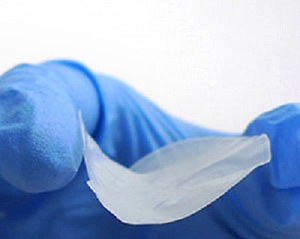'Wonder' material to clean oil spills
Research news
Deakin University scientists have manufactured a revolutionary material that can clean up oil spills, which could save the earth from future disasters like the 2010 Gulf Coast BP disaster that wreaked environmental havoc and cost a reported $40 billion.
The major breakthrough material, which literally absorbs oil like a sponge, is the result of support from the Australian Research Council and is now ready to be trialled by industry, after two years of refinement in the laboratory at Deakin’s Institute for Frontier Materials (IFM).
The breakthrough has just been published in “Nature Communications.”
Alfred Deakin Professor Ying (Ian) Chen, the project team leader and a lead author of the paper, said the material was the most exciting advancement in oil spill clean-up technology in decades.
“Oil spills are a global problem and wreak havoc on our aquatic ecosystems, not to mention costing billions of dollars in damage,” Professor Chen said.
“Everyone remembers the Gulf Coast disaster, but here in Australia they are a regular problem, and not just in our waters. Oil spills from trucks and other vehicles can close freeways for an entire day, again amounting to large economic losses.
“Current methods of cleaning up oil spills are inefficient and unsophisticated, taking too long, and causing ongoing and expensive damage, which is why the development of our technology was supported by the Australian Research Council.”
“We are so excited to have finally got to this stage after two years of trying to work out how to turn what we knew was a good material into something that could be practically used,” he said.
“In 2013 we developed the first stage of the material, but it was simply a powder. This powder had absorption capabilities, but you cannot simply throw powder onto oil – you need to be able to bind that powder into a sponge so that we can soak the oil up, and also separate it from water.”
The lead author of the paper, IFM scientist Dr Weiwei Lei, an Australian Research Council Discovery Early Career Research Awardee, said turning the powder into a sponge was a big challenge.
“But we have finally done it by developing a new production technique,” Dr Lei said.
“The ground-breaking material is called a boron nitride nanosheet, which is made up of flakes that are just several nanometers (one billionth of a meter) in thickness. The material contains tiny holes that provide the surface area to absorb oils and organic solvents up to 33 times its own weight.”
The research team, which included scientists from Drexel University, Philadelphia, and Missouri University of Science and Technology, started with boron nitride powder known as “white graphite” and broke it into atomically thin sheets that were used to make a sponge.
Professor Chen explained that the material would absorb oil, which naturally floats to the water surface, in the space of only around 20 minutes. Once a sponge layer fills up, it would be collected and replaced with a new sponge until all the oil is collected.
Professor Yury Gogotsi from Drexel University said boron nitride nanosheets did not burn, could withstand flame, and can be used in flexible and transparent electrical and heat insulation, as well as many other applications.
“We are delighted that support from the Australian Research Council allowed us to participate in this interesting study and we could help our IFM colleagues to model and better understand this wonderful material, ” Professor Gogotsi said.
The research team is now ready to have their “sponge” trialled by industry.
The nanotechnology team at IFM has been working on boron nitride nanomaterials for two decades and is an internationally recognised leader in boron nitride nanotubes and nanosheets.
Share this story
 'Wonder substance:' boron nitride nanosheets could prevent future oil spill disasters.
'Wonder substance:' boron nitride nanosheets could prevent future oil spill disasters.
